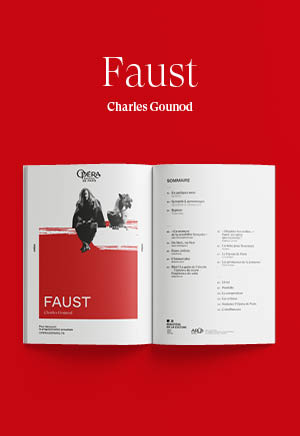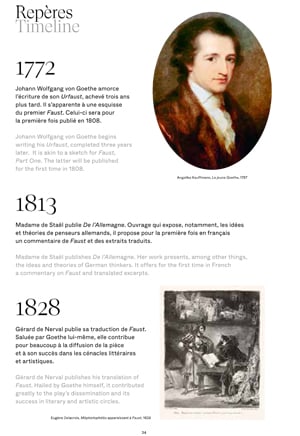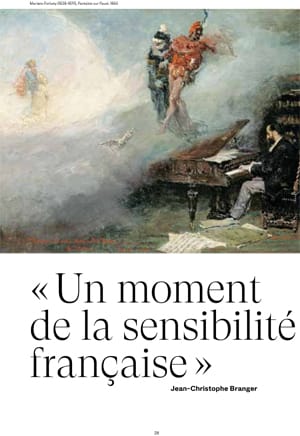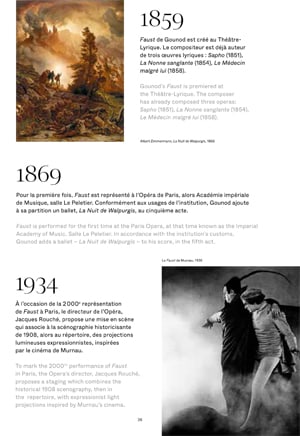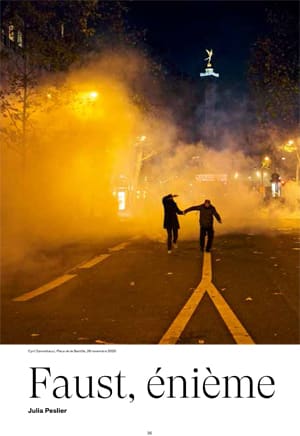Synopsis
Listen to the synopsis
Selling his soul to the devil for eternal youth is Faust’s – inevitably risky – gamble. By joining forces with the diabolical Mephistopheles, the elderly scholar recovers a youthfulness that allows him to win over the beautiful Marguerite, but at what cost???
When Charles Gounod set to work on the myth made famous by Goethe, he had not yet known any true success. The melodic invention and dramatic intensity of his Faust, premiered in 1859 at the Théâtre Lyrique, changed all that. Although Carré and Barbier’s libretto focused more on Marguerite’s fall and redemption than on the hero’s metaphysical dimension, this did not prevent the work from becoming a national monument, inspiring even Hergé, whose Castafiore sings the famous “Jewel song”.
Tobias Kratzer’s staging, with its spectacular videos, conjures up a contemporary Paris, a grandiose setting and a place of iniquity for young people struggling with their inner fears.
Duration : 3h42 with 2 intervals
Language : French
Surtitle : French / English
Artists
Opera in five acts (1859)
Creative team
Cast
The Paris Opera Orchestra and Chorus
Media


Watch online the recording from season 21/22 on Paris Opera Play, with Benjamin Bernheim, Ermonela Jaho, Christian Van Horn, Florian Sempey...
Access and services
Opéra Bastille
Place de la Bastille
75012 Paris
Public transport
Underground Bastille (lignes 1, 5 et 8), Gare de Lyon (RER)
Bus 29, 69, 76, 86, 87, 91, N01, N02, N11, N16
Calculate my route-
Cloakrooms
Free cloakrooms are at your disposal. The comprehensive list of prohibited items is available here.
-
Bars
Reservation of drinks and light refreshments for the intervals is possible online up to 24 hours prior to your visit, or at the bars before each performance.
-
Parking
You can park your car at the Q-Park Opéra Bastille. It is located at 34 rue de Lyon, 75012 Paris.
In both our venues, discounted tickets are sold at the box offices from 30 minutes before the show:
- €35 tickets for under-28s, unemployed people (with documentary proof less than 3 months old) and senior citizens over 65 with non-taxable income (proof of tax exemption for the current year required)
- €70 tickets for senior citizens over 65
Get samples of the operas and ballets at the Paris Opera gift shops: programmes, books, recordings, and also stationery, jewellery, shirts, homeware and honey from Paris Opera.
Opéra Bastille
- Open 1h before performances and until performances end
- Get in from within the theatre’s public areas
- For more information: +33 1 40 01 17 82
Online
Opéra Bastille
Place de la Bastille
75012 Paris
Public transport
Underground Bastille (lignes 1, 5 et 8), Gare de Lyon (RER)
Bus 29, 69, 76, 86, 87, 91, N01, N02, N11, N16
Calculate my route-
Cloakrooms
Free cloakrooms are at your disposal. The comprehensive list of prohibited items is available here.
-
Bars
Reservation of drinks and light refreshments for the intervals is possible online up to 24 hours prior to your visit, or at the bars before each performance.
-
Parking
You can park your car at the Q-Park Opéra Bastille. It is located at 34 rue de Lyon, 75012 Paris.
In both our venues, discounted tickets are sold at the box offices from 30 minutes before the show:
- €35 tickets for under-28s, unemployed people (with documentary proof less than 3 months old) and senior citizens over 65 with non-taxable income (proof of tax exemption for the current year required)
- €70 tickets for senior citizens over 65
Get samples of the operas and ballets at the Paris Opera gift shops: programmes, books, recordings, and also stationery, jewellery, shirts, homeware and honey from Paris Opera.
Opéra Bastille
- Open 1h before performances and until performances end
- Get in from within the theatre’s public areas
- For more information: +33 1 40 01 17 82
Online

Discover opera and ballet in another way

Dive into the Opera world and get insights on opera and pop culture or ballet and cinema. Scan this code to access all the quiz and blindtests on your mobile.

You will also like















































































